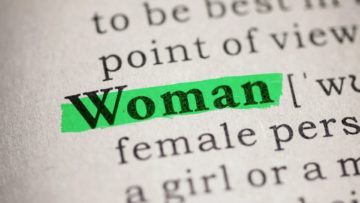by Steven Gimbel and Gwydion Suilebhan
 For the last several years, elected Republicans, full of anti-trans zeal, have challenged their opponents to define the word “woman.” They aren’t really curious. They’re setting a rhetorical trap. They’re taking a word that seems to have a simple meaning, because the majority of people who identify as women resemble each other in some ways, then refusing to consider any of the people who don’t.
For the last several years, elected Republicans, full of anti-trans zeal, have challenged their opponents to define the word “woman.” They aren’t really curious. They’re setting a rhetorical trap. They’re taking a word that seems to have a simple meaning, because the majority of people who identify as women resemble each other in some ways, then refusing to consider any of the people who don’t.
Lexicographers—the people who put together the dictionaries—care more about words than most of us. Of late, they’ve noticed how their beloved definitions have been abused by conservatives, and now a few have struck back. On December 13, the Cambridge Dictionary broadened their definitions of “man” and “woman” to include people who identify as either.
The original definition of “woman”: an adult female human being.
The new addition to the definition: an adult who lives and identifies as female though they may have been said to have a different sex at birth.
Losing their gotcha question infuriated conservatives. Fox News howled that “this change was met with pushback from many, who argued that redefining society’s categorization of gender and sex is harmful and inaccurate.” Dan McLaughlin, a senior writer at National Review called the change Orwellian: “1984 wasn’t supposed to be a how-to manual,” he tweeted.
Unfortunately for conservatives, they’re wrong. That is precisely how dictionaries are supposed to work. Dictionaries have always been political documents. For that, we have a Founding Father to thank.
Noah Webster fought in the Revolutionary War. He was dedicated to American independence. When he put down his musket, he picked up a pen and compiled An American Dictionary of the English Language. Even his title contained a slap in the face to the British. To the Brits, proper locution was the King’s English. Webster calling his work an American dictionary took the King’s logo, so to speak, off of our most important technology: words.
Webster’s linguistic freedom fighting liberated the language from its former owners. More importantly, his new work gave political power over the words themselves to the citizens of the new republic, rather than to those in power. In creating his dictionary, Webster canvassed the freed American colonies, speaking to ordinary Americans. (Well, to the White ones, anyway.) He collected Americanisms—new terms the Brits didn’t recognize—and inserted them into the language. He changed spellings, too, removing the letter “u” from “colour,” for example.
More to the present point: he legitimized the spelling “wimmin.”
After Webster, the dictionary wasn’t a “word cop” instruction manual any more. Instead of telling people how words were supposed to be used, the dictionary documented how people were already using words. In Through the Looking Glass, Humpty Dumpty tells Alice that “When I use a word, it means just what I choose it to mean, nothing more, nothing less.” That’s the power Webster gave the average American.
The editors at the Cambridge Dictionary followed in Webster’s footsteps, asking how the word “woman” is, in fact, used. As it happens, the seemingly simple Republican definition didn’t stand up to scrutiny.
In fact, the definition of the word “woman” has been considered complicated for quite some time. For more than 30 years, at least since the publication of Judith Butler’s Gender Trouble, people have understood those complexities.
In a nutshell: a perfect definition is based on the essential properties of the things that correspond to the word being defined. Those essential properties have to belong to all things that would correspond to the word in question. For example, a spouse is a married human being. If you’re not married, or you’re not a human being, you’re not a spouse. So here’s where this gets complicated: what are the essential properties of a woman?
It’s certainly true that most women share a wide range of properties: some biological, some behavioral, some psychological. Which of those properties, however, are definitional? We could consider chromosomes, genitalia, hormone levels, or skeletal structure, but none of those are consistent. A sizable percentage of women have what seem, on the surface, like “male” versions of those characteristics, and vice versa. None of them suffice to define “woman.”
Conservatives want the words “man” and “woman” to be both mutually exclusive (you can only be one or the other) and categorical (cover everyone), but the evidence doesn’t support those definitions. This has been common knowledge among scholars for more than a generation. Dictionaries, frankly, are late in catching up with our best understanding of the matter.
The meanings of words change when the ways we use them change. Webster understood this, and in an act of American patriotism, he showed us that sometimes, the meanings of words change for legitimate political reasons. In the decades after the Revolutionary War, American conservatives eventually objected to his approach, which they called radical. Those are the same voices objecting to what Cambridge has just one. Clearly, unlike the meanings of words, some things never change.
